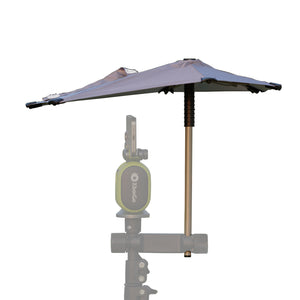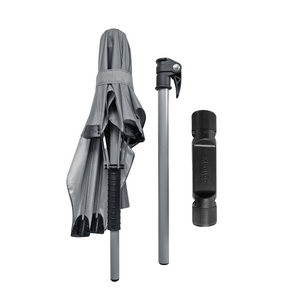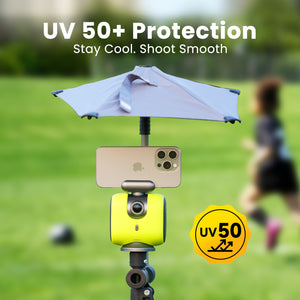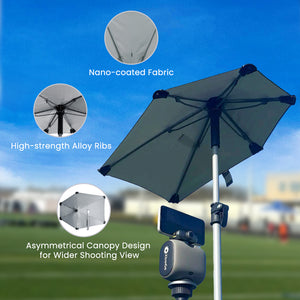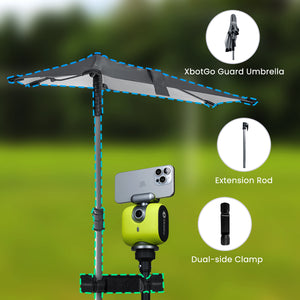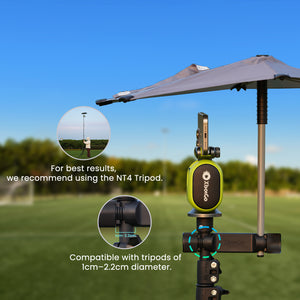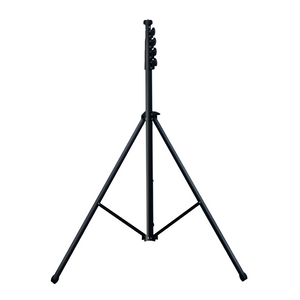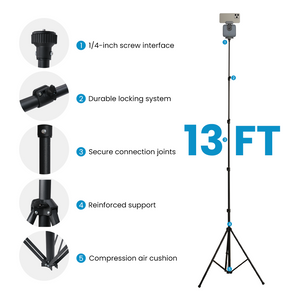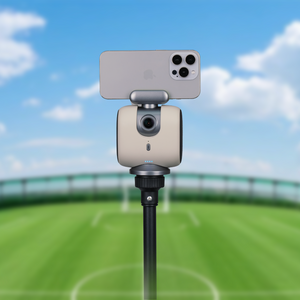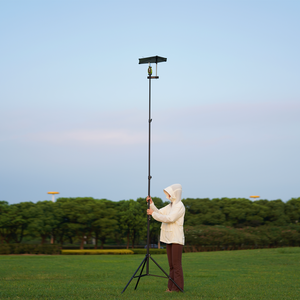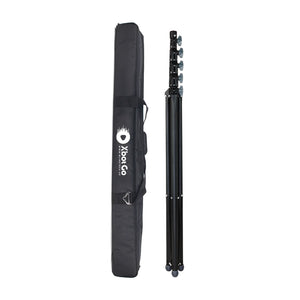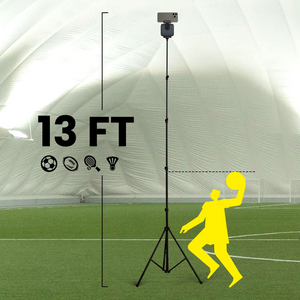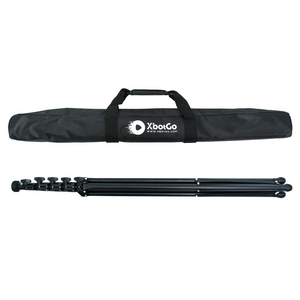XbotGo Chameleon AI Sports Camera
So filmt man Fußballturniere: 5 unverzichtbare Techniken
Ob Sie nun Ihr erstes American-Football-Turnier filmen oder Ihre Fähigkeiten perfektionieren wollen – die Spannung und die blitzschnellen Bewegungen einzufangen, kann eine Herausforderung sein. Für wirklich spektakuläre Aufnahmen reicht es nicht, einfach nur die Ausrüstung einzupacken und am Veranstaltungsort zu erscheinen.
Man braucht einen Platz mit optimaler Sicht auf den Platz, ein stabiles Stativ und gute Beleuchtung – und das ist erst der Anfang. Aufnahmen bergen oft Herausforderungen, die eine sorgfältige Vorbereitung und das nötige Wissen erfordern, um knifflige Situationen zu vermeiden.
Vergessen Sie, einen Takt zu verpassen, indem Sie diese 5 detaillierten Techniken anwenden, die eine nahtlose Berichterstattung vom Münzwurf bis zum Schlusspfiff garantieren.
5 unverzichtbare Aufzeichnungstechniken für Fußballturniere
Meistern Sie es, unzählige Schüsse und kraftvolle Schüsse mithilfe der folgenden, detailliert erklärten Aufnahmetechniken einzufangen und zu speichern. Setzen Sie sie ein und erleben Sie, wie sie Ihre Highlights und Ihre gesamten Fußball-Streams grundlegend verändern.
Für ausreichende Stromversorgung und Stabilität sorgen

Jede Fußballaufnahme ist vollständig von einer Stromversorgung für das Aufnahmegerät abhängig. Wird der Strombedarf nicht ausreichend gedeckt, ist die Aufnahme unmöglich, und Ihr Hauptplan für den Turniertag ist hinfällig.
Es kann einem schon mal die Tränen in die Augen treiben, wenn die Kamera plötzlich ausgeht, doch das Spielgeschehen auf dem Platz geht weiter. Die vielen aufeinanderfolgenden Fußballspiele können die Akkus schnell leeren. Man mag sich zwar mit vollem Akku gut gerüstet fühlen, aber der Akku kann einen manchmal völlig unvorbereitet treffen; deshalb ist vorausschauende Planung wichtig.
Die Stromversorgung spielt also eine entscheidende Rolle. Sie sollten unbedingt sicherstellen, dass Ihnen nie der Strom ausgeht oder dass es zu vermeidbaren Störungen kommt. Deshalb ist die Investition in effiziente Stromversorgungslösungen der Schlüssel zu einer unterbrechungsfreien Stromversorgung.
Beim Kauf von Kameraakkus ist die Langlebigkeit und kurze Ladezeit das wichtigste Kriterium. Informieren Sie sich vor dem Kauf, welche Akkus für Ihre Aufnahmegeräte während der gesamten Fußballsaison ausreichen. Überlegen Sie sich, wie viele Kameras gleichzeitig laufen, wie viele Spiele Sie filmen und wie viel Zeit Sie pro Spiel einplanen.
Multiplizieren Sie für jedes Gerät einfach die Betriebsspannung und den Betriebsstrom aus den Kameraspezifikationen, um die Leistungsaufnahme in Watt zu ermitteln. Für den Gesamtverbrauch addieren Sie alle Werte und verwenden diesen Wert zur Schätzung der benötigten Leistung. Bei der Berechnung ist es ratsam, lieber etwas mehr als zu wenig zu berechnen.
Und noch besser: Besorgen Sie sich mehr als zwei Akkus, um die Stromversorgung zu rotieren. Während ein Akku die Kamera mit Strom versorgt, werden die anderen geladen oder stehen bereit, um den funktionierenden Akku zu ersetzen. Die Ladesysteme müssen ebenfalls gleichermaßen zuverlässig sein und können Netzstrom, Powerbanks oder Solarpaneele nutzen.
Priorisieren Sie Automatisierungsfunktionen in Ihrer Aufnahmeausrüstung.

Es kommt häufig vor, dass die Fußballaufnahmen aufgrund menschlicher Fehler bei der Bedienung der Geräte nicht gelingen. Die Verwaltung der Geräte kann für Eltern und Trainer eine große Herausforderung darstellen – von der Einrichtung über die Konfiguration bis hin zur Anwendung –, damit sie keinen Moment auf dem Spielfeld verpassen.
Wenn mehrere Spiele direkt nacheinander stattfinden, steigt der Druck enorm an, und Erschöpfung und Verwirrung machen sich breit, wenn man sie am wenigsten erwartet. Obwohl man dachte, man sei ein Multitasking-Talent, erinnert einen diese Spielserie daran, dass man auch nur ein Mensch ist und seine Grenzen hat.
In diesem Moment könnte die überwältigende Jongliererei Sie dazu zwingen, sich hinzusetzen und eine Trinkpause einzulegen. Aber unterbricht das laufende Spiel, damit Sie die Aufnahme fortsetzen können? Natürlich ist das nie der Fall, und leider werden die intensivsten Momente nicht im Bild der manuellen Kamera landen.
Wenn man die Kamera selbst halten und positionieren muss, ist die Wahrscheinlichkeit hoch, dass man Aufnahmen verpasst, den richtigen Moment nicht antizipiert und unscharfe Bilder entstehen. Man ist ständig in Bewegung und muss schnell rennen, um mit dem Tempo der Spieler mithalten zu können. Und durch die ständigen Bewegungen der Zuschauer besteht die Gefahr, dass man geblendet wird, wenn man sich im Zuschauerbereich befindet.
Ihre Körpergröße könnte die Aufnahmen beeinträchtigen. Sie können entweder auf den Sitzen stehen oder den VVIP-Bereich buchen, um möglichst ungestört zu sitzen. Warum unnötige Umwege gehen, wenn Sie einfach KI-gestützte Geräte nutzen können, die Ihnen die ständige Bedienung der Kamera ersparen?
Die Automatisierung der XbotGo Chameleon KI-Kamera ist dank ihrer hohen Genauigkeit unübertroffen. Sie fokussiert sich automatisch auf das Spielfeld, indem sie Trikotnummern erkennt und Spielzüge erfasst – ganz ohne Ihr Zutun. Kurz gesagt: Sie erledigt fast alles, was ein Mensch kann.
Es folgt zwar nicht generell der Bewegung, aber es erfasst gezielt die wichtigsten Ereignisse eines American-Football-Spiels auf dem gesamten Spielfeld. Erwarten Sie Highlights von Touchdowns, Strafen und den überraschenden Interceptions, die die Zuschauer begeistern, wenn das Spiel an Fahrt gewinnt. Die Übertragung läuft durchgehend und ohne Unterbrechungen, da sie mit einem langen Stativ erhöht werden kann.
Der Wechsel zwischen den Spielen verläuft reibungsloser und erfordert nur minimalen Einrichtungsaufwand. Mit der Xbotgo-App können Sie die Kameraeinstellungen vorprogrammieren, indem Sie Sportart, Altersgruppe und Spielfeldgröße auswählen. Das vereinfacht die Übergänge, insbesondere wenn sich Spiele überschneiden und die Zeit drängt.
Als Smartphone-basierte Aufnahmeplattform werden Sie die einfache und schnelle Bedienung der Benutzeroberfläche lieben, die sich genauso intuitiv bedienen lässt wie andere Apps auf Ihrem Smartphone. Auch die Vielseitigkeit ist erstklassig, denn die Plattform liefert konstant 4K-Videoqualität – selbst bei wechselnden Licht- und Wetterverhältnissen in Fußballstadien.
Beschaffung geeigneter Speichersysteme und Videoorganisation
An Turniertagen finden mehrere Fußballspiele nacheinander statt, wodurch sich eine Menge Videodateien ansammelt. Bei den zahlreichen Aufnahmen der Turnier-Highlights entsteht eine riesige Datenmenge, die übersichtlich organisiert werden muss.
Natürlich spielt das auch für Ihre Dateispeichermethoden und die Speicherkapazität Ihrer Speichersysteme eine Rolle, selbst wenn Sie die Dateien später wieder abrufen möchten. Wie ärgerlich ist es, wenn die Kamera mitten im Turnier meldet, dass der Speicher voll ist und keine weiteren Inhalte aufnehmen kann? Das ist fatal, denn die Kamera stoppt die Aufnahme und wartet, bis Sie manuell Speicherplatz freigeben.
Andere Kameras löschen die alten Dateien automatisch, um die Aufnahme fortzusetzen. Sobald Sie sicher sind, dass Ihre Dateien verfügbar sind, werden sie ohne Ihr Wissen gelöscht. Glücklicherweise können Sie diese Enttäuschung vermeiden, indem Sie SD-Karten mit mindestens 256 GB Speicherkapazität verwenden, die für mehrere Spiele ausreichen.
Wenn die Kamera über eine Cloud-Speicherfunktion verfügt, ist das ein großer Vorteil, da die Aufnahmen auf die Server hochgeladen werden, wo sie nicht verloren gehen und jederzeit leicht abgerufen werden können. SD-Karten sind greifbar und können leicht verlegt werden, wenn man nicht vorsichtig ist. Wir empfehlen daher, die Fußballdaten sofort nach dem Entnehmen der SD-Karte aus der Kamera auf Ihren PC oder Laptop zu übertragen.
Wie die Batterien sind auch mehrere SD-Karten Gold wert. Ist die in der Kamera eingelegte Karte voll, wechselt man sofort zur leeren, und die Aufnahme wird kurz unterbrochen. Lieber die paar Minuten für den SD-Kartenwechsel, als wenn alles stillsteht und man die spannendsten Momente des Spiels nicht mehr einfangen kann.
Ebenso müssen Sie den benötigten Speicherplatz für Ihre Filmaufnahmen ermitteln, indem Sie die Anzahl der Spiele und die ungefähre Dateigröße berücksichtigen. Je höher die Videoqualität, desto mehr Speicherplatz wird benötigt. Beispielsweise erzeugen 4K-Aufnahmen größere Dateien als HD-Aufnahmen.
Gleichbleibend klares Videomaterial auch unter unvorhersehbaren Turnierbedingungen

Es gibt keine Garantie dafür, dass die Bedingungen am Fußballstadion bis zu Ihrer Abreise günstig sein werden. Die Witterungsbedingungen ändern sich häufig, und während einige Ihrem Vorhaben förderlich sind, wirken sich andere nachteilig aus.
Im einen Moment kann es bewölkt und kühl sein, im nächsten brennt die Sonne unerbittlich, oder es fängt plötzlich an zu nieseln. Auch wenn der Wetterbericht eine Vorhersage für den Tag liefert, denken Sie daran, dass es sich nur um eine Prognose handelt und ein abrupter Wetterumschwung möglich ist. Wenn Sie verschiedene Spiele besuchen, können sich Atmosphäre und Beleuchtung der Veranstaltungsorte unterscheiden, insbesondere beim Wechsel von einem offenen Feld in eine Halle.
Letztendlich ist es entscheidend, ein Gleichgewicht zwischen den verschiedenen Einstellungen zu finden, um eine gleichbleibende Aufnahmequalität zu gewährleisten. Daher empfiehlt es sich, die Kameraeinstellungen manuell anzupassen: Auto-ISO, Verschlusszeit von mindestens 1/1000 Sekunde und eine Blende von mindestens f/2.8, auch wenn die meisten modernen Sportkameras heutzutage über Autofokus verfügen.
Packen Sie für das Turnier unbedingt eine wasserdichte Kamerahülle ein, um Ihre Ausrüstung vor Staub, Regen und Schnee zu schützen. Eine Mattebox und eine Gegenlichtblende sollten ebenfalls in der Tasche sein, da sie verhindern, dass intensive Sonnenstrahlen auf die Kamera treffen und Streulicht verursachen. So vermeiden Sie unschöne Lichtstreifen im Fußballvideo und schützen gleichzeitig das Objektiv vor Beschädigungen.
Eine weitere Möglichkeit besteht darin, die Kamera so zu positionieren, dass sie nicht direkt in die Sonne oder eine helle Lichtquelle gerichtet ist. Gegebenenfalls müssen Sie die Kamera gelegentlich neigen oder drehen, um die optimale Position für scharfe Bilder zu finden. Nehmen Sie außerdem ein Mikrofasertuch mit, um die Linse abzuwischen, insbesondere bei ungewöhnlich hoher Luftfeuchtigkeit.
Da die Auflösung scharf und klar bleibt, sollte der Ton auch bei unterschiedlichen Wetterbedingungen und Umgebungen stabil und gut verständlich sein. Verwenden Sie einen Windschutz und positionieren Sie ihn in Richtung der Geräuschquelle (nicht unbedingt des Windes), um Störgeräusche am Kameramikrofon zu minimieren. Für zusätzliche Audioausgabe empfiehlt sich außerdem ein hochwertiges Ansteckmikrofon.
Meisterhafte und professionelle Aufzeichnung mehrerer Fußballspiele

Haben Sie sich jemals vorgestellt, in welchen Trubel Sie geraten könnten, wenn sich die Fußballspiele überschneiden und Sie keine solide Strategie haben? Sie können sich leicht überanstrengen; ein kompletter Erschöpfungszustand ist sicherlich nicht das, was Sie sich wünschen, wenn das Fußballturnier noch läuft.
Die größte Herausforderung besteht meist darin, die Spiele zu priorisieren, wenn sie zeitlich zusammenfallen oder direkt nacheinander stattfinden. Jedes Team hat seine Stärken, seine Platzierung in der Liga und natürlich auch persönliche Vorlieben. Die Reihenfolge der Spiele sollte sich nach diesen Kriterien richten, denn Teams mit einer größeren Fangemeinde und Titelchancen sorgen für mehr Begeisterung und Euphorie.
Wenn man sich bei der Planung hauptsächlich auf sein Gehirn verlässt, kann es leicht passieren, dass man geplante Aufnahmen verpasst. Ein auf Ihre Pläne zugeschnittener Spielplan ist die Geheimwaffe, um organisiert zu sein und bei jedem Footballspiel zu filmen.
Eine hilfreiche Idee ist, den Kalender auf dem Smartphone als Erinnerung einzurichten. Gehen Sie zurück zum Turnierplan und notieren Sie übersichtlich alle Spieltermine, Uhrzeiten, Spielorte und alle weiteren wichtigen Details. Teilen Sie den Zugriff auf diese digitalen Plattformen mit Ihrem Aufnahmeteam oder, falls Sie Trainer, inaktiver Spieler oder Helfer sind, damit Sie den Überblick behalten.
Alles läuft nach Plan, wenn das gesamte Team an einem Strang zieht und verlässliche Unterstützung vorhanden ist. Engagieren Sie zusätzliche professionelle Fußball-Videorecorder oder suchen Sie Freiwillige für eine intensive Aufnahmephase. Die Delegation der Aufzeichnung einzelner Spiele reduziert den Arbeitsdruck, sodass Sie sich voll und ganz auf ein bestimmtes Spiel konzentrieren können.
Das Ende
Bei der Aufzeichnung von American-Football-Turnieren kommt es vor allem auf strategische Planung an, um die Energie und das Geschehen auf dem gesamten Spielfeld einzufangen. Die fünf Techniken der Football-Aufzeichnung sind dabei bahnbrechend.
Ihre Zuschauer werden die dynamische Wirkung der ansprechenden Fußballinhalte, die malerischen Aufnahmen und die besonderen Höhepunkte absolut lieben.
Ob zum Festhalten von Erinnerungen oder für professionelle Aufnahmen zur Analyse – der XbotGo Chameleon ist die beste Wahl für Ihre erste Fußballaufnahme. Dank der KI-gestützten Aufnahmefunktion und der herausragenden Eigenschaften genießen Sie absolute Entspannung.
XbotGo Chameleon AI Sports Camera
Capture every moment with AI-powered tracking. Perfect for coaches, parents, and athletes who want seamless footage without manual filming.








 Soccer
Soccer Basketball
Basketball Ice Hockey
Ice Hockey Football
Football Handball
Handball










